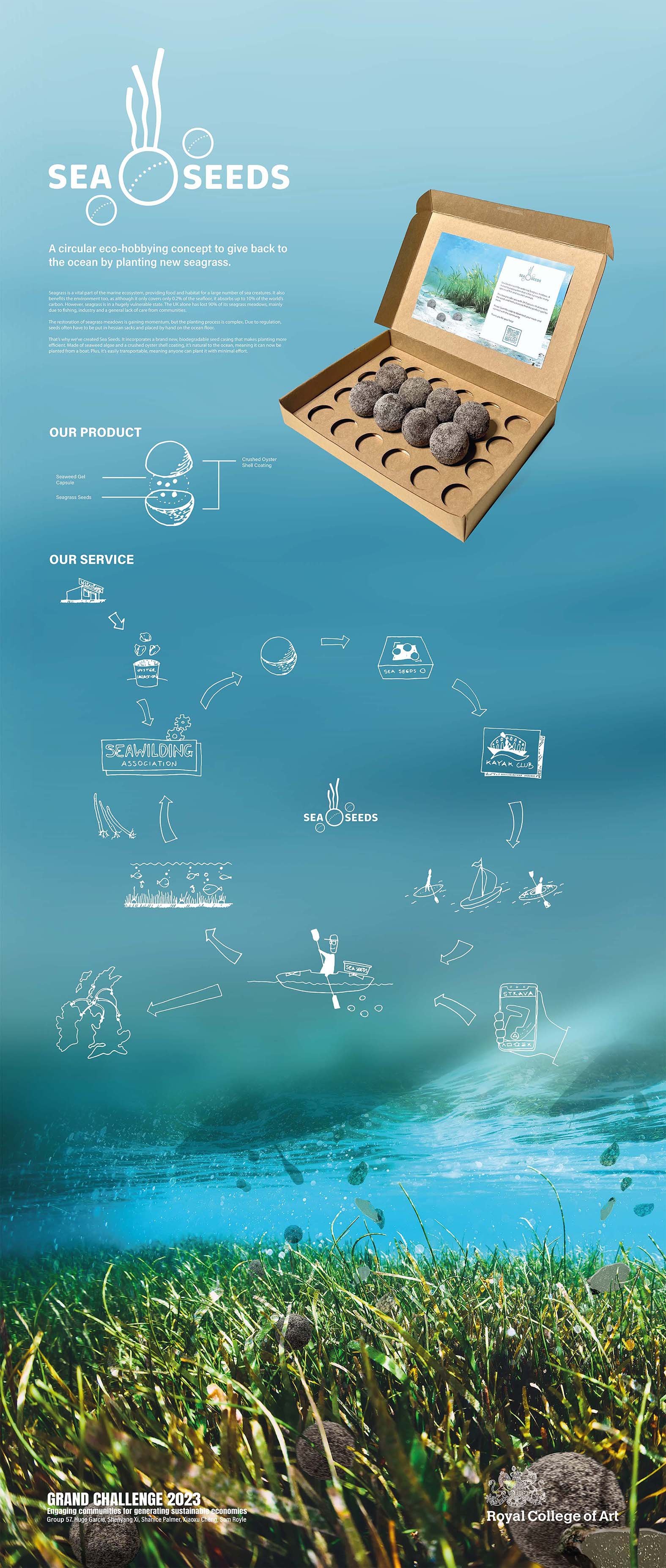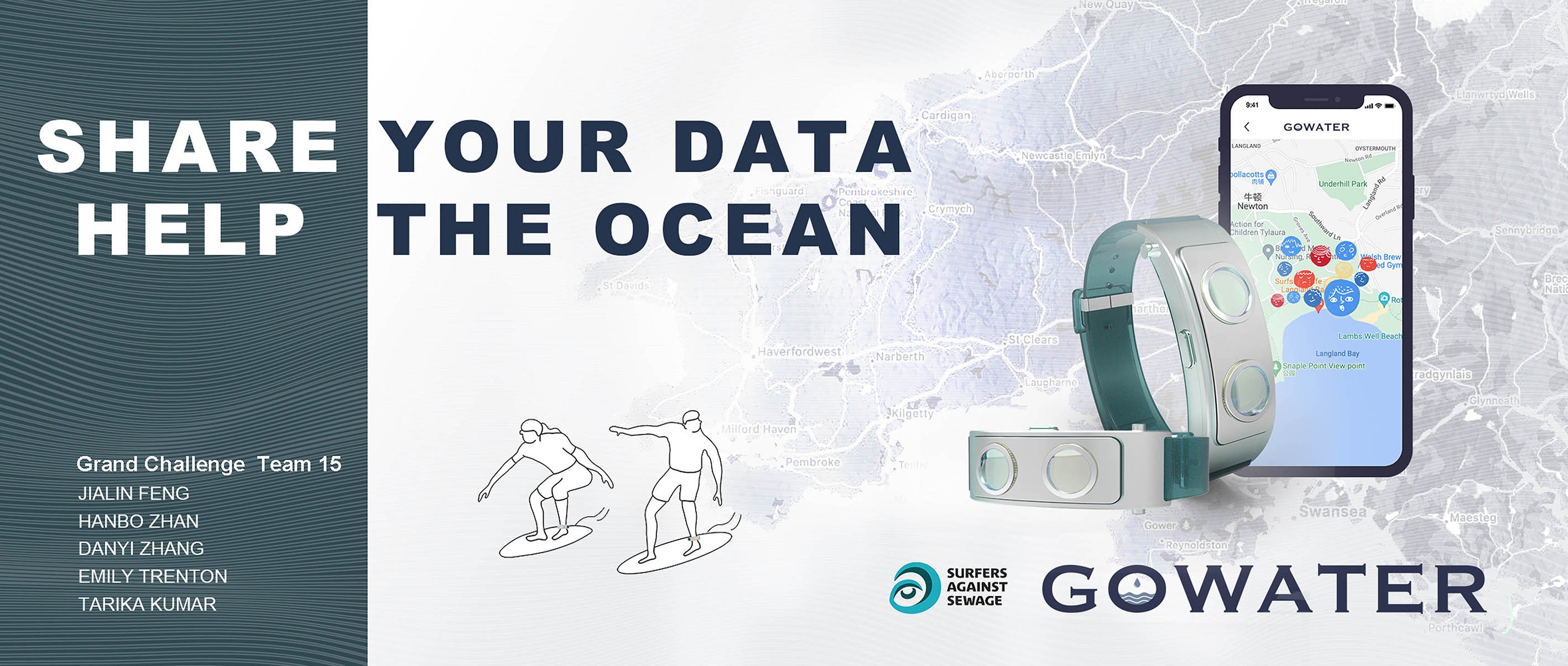
Key details
Date
- 10 March 2023
Author
- RCA
Read time
- 2 minutes
The Royal College of Art has today announced the three winners of the RCA Grand Challenge 2022/23: Engaging Communities for Generating Marine Sustainable Economies as an exhibition of the shortlisted entries opens at the RCA Battersea campus.
Key details
Date
- 10 March 2023
Author
- RCA
Read time
- 2 minutes
Delivered in partnership with the Royal National Lifeboat Institution (RNLI), students were tasked with exploring the ways design can leverage and stimulate citizen science-led practices for increasing the health and productivity of the world’s oceans. This year’s Challenge aligns with the goals of the UNESCO Ocean Decade (2021-2030) for which the RCA has been named a Decade Implementing Partner.
In January, 97 student groups partnered with RNLI volunteers across the UK, with the RNLI’s integration within these diverse coastline communities providing a valuable network to connect the student groups to the local populations and the ocean. The resulting design solutions are all aimed at increasing the resilience of UK coastal communities.
From today until 14 March 2023, the shortlisted projects will be on display to the public in the Grand Challenge exhibition at the RCA’s new Battersea campus designed by Herzog & de Meuron. These creative innovations demonstrate the effectiveness of a community-centred approach to design, whilst revealing intriguing qualitative data about ocean-based economies in the UK. The devised solutions address a range of topics including increasing sea grass growth, reducing the erosion of seabeds, and upcycling abandoned boats.
The RCA Grand Challenge is the biggest single-institution postgraduate design project in the world. Established in 2016, the annual challenge runs across the entire School of Design, bringing together MA students in a range of disciplines including Design Products, Fashion, Innovation Design Engineering, Global Innovation Design, Intelligent Mobility, Service Design and Textiles. Students are briefed to tackle key global challenges through collaboration, and by responding to social, cultural, and economic factors as well as science and technology.
The three winning projects were chosen by a judging panel including representatives from the RCA, the RNLI and the UK Government’s Department for Environment, Food and Rural Affairs.
The winning projects are:
First Place: Sea Seeds
Hugo Garcia (MA/MSc Innovation Design Engineering), Shenyang Xi (MA Design Products), Shanice Palmer (MA Fashion), Xiaoxu Cheng (MA Textiles), Sam Royle (MA Service Design)

Sea Seeds is a circular eco-hobbying concept developed from Oban, Scotland that enables kayakers, sailors and other water enthusiasts to give back to the environment by planting new seagrass while enjoying the ocean. It incorporates a brand new biodegradable seed casing made from seaweed algae and crushed oyster shell to make planting more efficient.
Second Place: GoWater
Tarika Kumar (MA/MSc Global Innovation Design), Hanbo Zhan (MA Design Products), Danyi Zhang (MA Service Design), Jialin Feng (MA Fashion), and Emily Trenton (MA Textiles)

GoWater is an integrated system consisting of a wearable sensor, a virtual map, and a data distribution system which empowers locals and visitors to contribute water quality data to charitable organisations through water sports activities in the Gower Peninsula in Wales.
Third Place: Pollenwave
Abigail Hoover (MA/MSc Global Innovation Design), Zijin Ling (MA Design Products), Yipeng Wang (MA Service Design), Richard Alexandre (MA/MSc Innovation Design Engineering)

Inspired by the severe decline of wild Atlantic salmon in Stranocum, County Antrim, Northern Ireland, Pollenwave is a biodegradable sensor system that monitors the temperature, pH, and oxygen levels in remote ocean locations. Spread in the ocean through underwater autonomous vehicles the sensors provide a more granular understanding of the environmental changes that affect marine life.
Runner Up: Insoluble Solutions
Xiaoyi Ye (MA Design Products), Xinyu Liu (MA Fashion), Ziwen Niu (MA Textiles), Tegan Mills (MA Service Design)

Insoluble Solutions is a filtration system that attracts and captures jellyfish from the estuary at Marchwood, Hampshire, extracting their mucus and collecting microplastics from the water.
Runner Up: The Great Boat Upcycling Challenge
Bhushan Deshmukh (MA Intelligent Mobility), Jiayi Wang (MA Design Products), Jiyun Xia (MA Fashion), Jacob Monk (MA Textiles), Isha Ghaisas (MA Service Design)

The Great Boat Upcycling Challenge is a TV show concept which would see teams express their creativity by upcycling abandoned boats from along the Truro River in a Creative Reality Show format. The work would be displayed and judged at an exhibition in Truro, called ‘The Boat Graveyard’.
